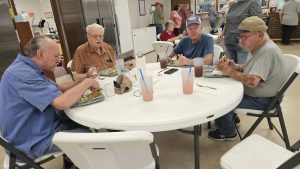Top Stories
Madison County Senior Center Faces Closure Amid Budget Cuts

The Madison County Senior Center is seeking community support as it faces significant budget and grant reductions that threaten its operations. Established in 1977, the center has been a vital resource for local seniors, providing meals and a space for social interaction. However, recent financial challenges have led to cutbacks that may force the center to close its doors.
On a typical Friday, families gather at the center to enjoy a meal featuring catfish, hushpuppies, seasoned potato bites, baked beans, and apple crisp. While the meals are designed to provide essential nutrition, they represent only a fraction of daily dietary needs. Senior Center Administrator Crystal Sherrick emphasized that the center serves as a meal program specifically for seniors, not a restaurant.
In the past year, the center has faced a series of challenges, including the elimination of to-go meals, which reduced its customer base significantly. Currently, the center is open three days a week, down from five days, due to reduced funding for staff and groceries. Meals are priced at $8 for the general public and $6 for seniors. The center serves over 600 meals each month, with a rotating menu that features different meals each day, except for the Friday catfish staple.
Funding primarily comes from Aging Matters in Cape Girardeau, which is supported through Medicaid. The center receives a reimbursement of $2 for each meal served to elderly recipients. This allows them to charge the reduced rate for seniors, but the higher price for younger patrons helps offset operational costs. “We don’t turn anyone away, ever,” Sherrick stated. Many patrons fall into a gap where they do not qualify for Medicaid but cannot afford home-delivered meals.
The center relies heavily on volunteers, with a dedicated team delivering meals to those unable to visit in person. Each week, volunteers travel extensive distances to ensure that meals reach those in need. In total, they deliver around 830 meals to Medicaid recipients and 260 meals to non-Medicaid patrons each month. Some of these patrons are unable to pay for their meals, while others refuse assistance despite having the means to contribute.
Financial difficulties intensified when the State of Missouri cut funding by 13% earlier this year. Sherrick noted that these cuts affected most senior centers across the state, compounding the pressure on their already tight budgets. Additionally, the center did not receive the expected $30,000 from the American Rescue Plan Act (ARPA), funds that had previously been distributed to numerous counties in Southeast Missouri. Further complicating matters, a grant from Walmart has been restricted to candidates in Arkansas only, limiting potential funding sources.
In August, the center reported expenses of $19,000, while its income was only $15,000. Much of the income derives from Medicaid reimbursements and dine-in meals. Sherrick expressed concern about the center’s sustainability, noting that many patrons depend on the meals not just for nourishment but also for social interaction.
The atmosphere at the center is lively, with patrons engaging in conversations while enjoying their meals. Musicians often perform, creating a welcoming environment. “You become like a family,” said volunteer Sharron Eck, who has been delivering meals for over 25 years. She highlighted the importance of companionship for many seniors, some of whom may be isolated and rely on the volunteers for social contact.
Despite the challenges, the center continues to prioritize meal quality, working with the only food vendor that will cooperate with them. Sherrick underscored that other communities have found ways to support their senior meal programs through local funding initiatives, such as additional taxes or fees. For instance, St. Charles County adds a dollar to their electric bill for this purpose, while St. Francois County has implemented a specific senior tax.
As the Madison County Senior Center navigates these financial hurdles, community awareness and support are crucial. Steve Head, a regular patron and retired engineer, expressed hope that increased visibility could bring more patrons through the doors. “It just helps if more people would come over here,” he noted. “Anybody can eat over here. A lot of people don’t know it’s around. If they did, they probably would.”
In light of these developments, the Madison County Senior Center stands at a crossroads, and the community’s response will determine its future.
-

 Lifestyle3 months ago
Lifestyle3 months agoLibraries Challenge Rising E-Book Costs Amid Growing Demand
-

 Sports3 months ago
Sports3 months agoTyreek Hill Responds to Tua Tagovailoa’s Comments on Team Dynamics
-

 Sports3 months ago
Sports3 months agoLiverpool Secures Agreement to Sign Young Striker Will Wright
-

 Lifestyle3 months ago
Lifestyle3 months agoSave Your Split Tomatoes: Expert Tips for Gardeners
-

 Lifestyle3 months ago
Lifestyle3 months agoPrincess Beatrice’s Daughter Athena Joins Siblings at London Parade
-

 World3 months ago
World3 months agoWinter Storms Lash New South Wales with Snow, Flood Risks
-

 Science3 months ago
Science3 months agoTrump Administration Moves to Repeal Key Climate Regulation
-

 Business3 months ago
Business3 months agoSoFi Technologies Shares Slip 2% Following Insider Stock Sale
-

 Science2 months ago
Science2 months agoSan Francisco Hosts Unique Contest to Identify “Performative Males”
-

 Science3 months ago
Science3 months agoNew Tool Reveals Link Between Horse Coat Condition and Parasites
-

 Sports3 months ago
Sports3 months agoElon Musk Sculpture Travels From Utah to Yosemite National Park
-

 Science3 months ago
Science3 months agoNew Study Confirms Humans Transported Stonehenge Bluestones









